

SAMOS
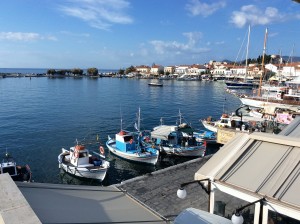 A ferry to Samos one morning, because it connects with a ferry to Kusadasi, Turkey. We arrive in the port of Pythagorio, where the front is lined with nothing but restaurants, now empty. The season is over. Bob finds us a room overlooking the harbour, and I find how to get to Turkey: the ferry leaves from Vathy, the other side of the island.
A ferry to Samos one morning, because it connects with a ferry to Kusadasi, Turkey. We arrive in the port of Pythagorio, where the front is lined with nothing but restaurants, now empty. The season is over. Bob finds us a room overlooking the harbour, and I find how to get to Turkey: the ferry leaves from Vathy, the other side of the island.
Next day, we wait at a bus stop (other people waiting – good, it means a bus will come), and take a winding bus over the hills and through orchards and vineyards and olive groves to Samos, which is how they signpost Vathy. Samian wine, Samian pottery (we dug for ornamented shards in the mud of the Medway at Chatham), and olives and pomegranates. Buy tickets, exorbitant price for short crossing to 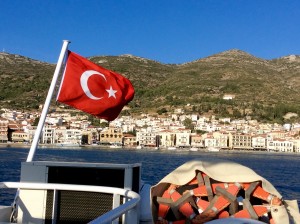 Turkey, then find a café with comfy chairs until boarding, late afternoon. When we board, other passengers are on a day trip, it seems, from Turkey. Goodbye Greece.
Turkey, then find a café with comfy chairs until boarding, late afternoon. When we board, other passengers are on a day trip, it seems, from Turkey. Goodbye Greece.
KUSADASI, SELCUK AND EPHESUS
Arrive in the dark at Kusadasi, and have to buy visas at 50 euros each on arrival, which clears out all our cash. Find ATM for Turkish lira. All pleasant and prosperous. Bob finds a good modern hotel, and we eat fish at a quayside restaurant. Next day a bus via grotty theme parks to Selçuk, 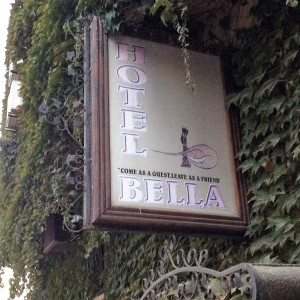
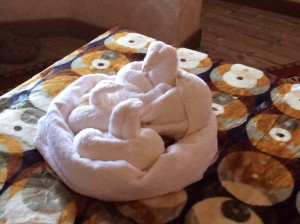 near Ephesus. At the bus station, having consulted Kindle Lonely Planet, I say Hotel
near Ephesus. At the bus station, having consulted Kindle Lonely Planet, I say Hotel 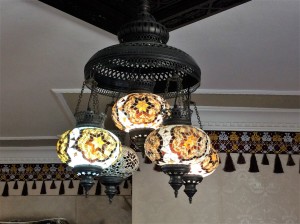 Bella is the place to stay at.
Bella is the place to stay at.
We find it, an old Turkish house (now = boutique hotel) with walls crammed with flower plates, tassels and other excitements. Jovial proprietor shows us our room with towels sculpted into elephants (these sculptures change each day, one day a swan and cygnets, another two horses), a bed with Suleiman’s seal incorporating the name of Allah, and a light with five mosaic lamps. The window looks out on a ruined Byzantine aqueduct littered with the remains of storks’ nests, with special cradles to encourage the storks, and the ruined basilica of St. John, yes our very own St John of Patmos who came here to write his Gospel, was banished by Diocletian to Patmos, then returned a very old man when Diocletian’s reign was over. His tomb is here, and they are doing up the basilica.
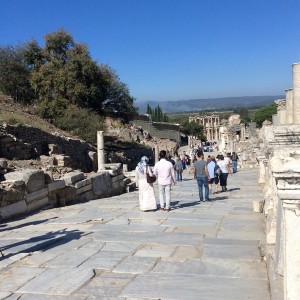 So, lunch – walk along cafes full of men, all ages except young, sitting at tables playing cards or board games and drinking tea, and find one with food – salad and rum babas without the rum. No other women here – it’s not where women or tourists come.
So, lunch – walk along cafes full of men, all ages except young, sitting at tables playing cards or board games and drinking tea, and find one with food – salad and rum babas without the rum. No other women here – it’s not where women or tourists come. 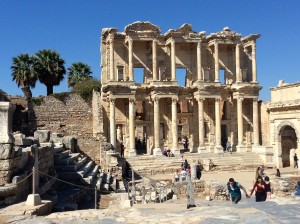
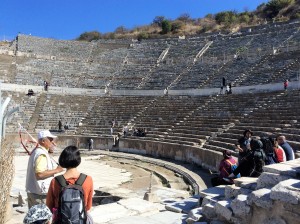 Breakfast on the roof, where waiter feeds the collared doves waiting on the wall. Beyond a dome and minarets glitter. A day at Ephesus, walking the ruins. Well, I enjoy it, I love ancient ruined cities, and there’s a fine library façade and some lovely carving – but I have been to Leptis Magna, Side, Antalya, Epidaurus, Delphi, loads of these cities with their theatres, and among the crowds from the cruise liners moored at Kusadasi I sneakily feel a certain déjà vue, even as I imagine St Paul in the theatre declaiming to the Ephesians, and walking up Harbour Street from the long silted harbour.
Breakfast on the roof, where waiter feeds the collared doves waiting on the wall. Beyond a dome and minarets glitter. A day at Ephesus, walking the ruins. Well, I enjoy it, I love ancient ruined cities, and there’s a fine library façade and some lovely carving – but I have been to Leptis Magna, Side, Antalya, Epidaurus, Delphi, loads of these cities with their theatres, and among the crowds from the cruise liners moored at Kusadasi I sneakily feel a certain déjà vue, even as I imagine St Paul in the theatre declaiming to the Ephesians, and walking up Harbour Street from the long silted harbour.
In the Selçuk museum there’s Priapus, a headless cherub in pixie boots whose vast penis supports a tray of garden produce. (He was often placed in gardens). But what really gives a thrill are the two Artemis statues, totemic, erect, glowing in the darkness. The great fertility goddess from the Artemesion, remote as an Inca god, wreathed in ornamental chains, with her 21 breasts (some say they are bulls testicles, another symbol of fertility – but, no, breasts is what they appear – or why not both). She is descended from the ancient Anatolian mother goddess Cybele, and we are awed. By Roman times she has morphed into Diana, powerful but reduced.
In the evening from the huge ruined basilica with St John’s grave, and a massively deep newly refurbished baptismal bath, we look beyond at hills and fields, with a 16th century mosque below, and we can see a pillar in a distant field. We speak to a girl 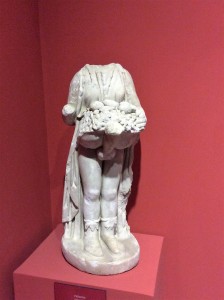
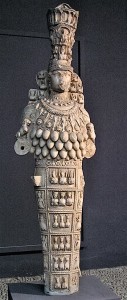
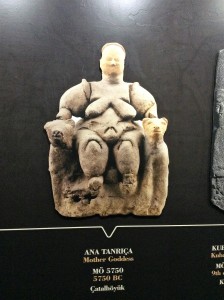
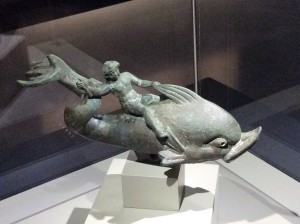 (Christian, very keen)taking a picture of us.
(Christian, very keen)taking a picture of us. 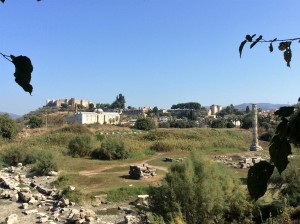 It is all that remains of the Artemesion, the Great Temple of Artemis, a wonder of the ancient world. We walk there next day – just a load of hewn stones among rough vegetation and a single column patched up as if with plasticine. Only the sound of birds, and the harsh distant scream of school children. Sic passet Gloria mundi. A man vainly waits to sell guide books. A boy
It is all that remains of the Artemesion, the Great Temple of Artemis, a wonder of the ancient world. We walk there next day – just a load of hewn stones among rough vegetation and a single column patched up as if with plasticine. Only the sound of birds, and the harsh distant scream of school children. Sic passet Gloria mundi. A man vainly waits to sell guide books. A boy 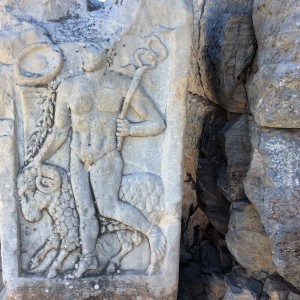 approaches with ‘Byzantine’ coins, rather new. No one else. Nearby a field of goats, chickens and scavenging jackdaws. The approaching pedestrian road is full of unused exercise machines.
approaches with ‘Byzantine’ coins, rather new. No one else. Nearby a field of goats, chickens and scavenging jackdaws. The approaching pedestrian road is full of unused exercise machines. 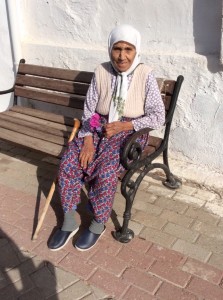 On the way back an elderly woman gives me a flower when I ask if it’s ok to take a pic of her.
On the way back an elderly woman gives me a flower when I ask if it’s ok to take a pic of her.
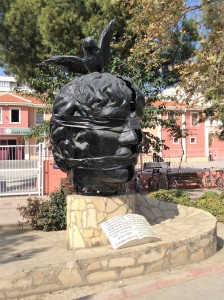 We are just tourists and see a prosperous county, Islamic, with the muezzin and most women with their hair covered. But we pass a bust of a vast black head split and bandaged. What is it? A young man tells us it is The Journalist. So, it’s about the gagged Press. (President Erdogan is supported by Islamicists, and his wife’s head is always covered. Back in UK, I read of journalists being imprisoned, for reporting on things like the Kurds desire for independence). How little we know.
We are just tourists and see a prosperous county, Islamic, with the muezzin and most women with their hair covered. But we pass a bust of a vast black head split and bandaged. What is it? A young man tells us it is The Journalist. So, it’s about the gagged Press. (President Erdogan is supported by Islamicists, and his wife’s head is always covered. Back in UK, I read of journalists being imprisoned, for reporting on things like the Kurds desire for independence). How little we know.
IZMIR
A bus down this fertile valley, mountains, rivers, vineyards, orchards, crops – it’s a painting by Claude Lorraine – and to Izmir – another ancient city but ruined by fire and fighting in 1922 as Ataturk gained control of the continent (the Greeks foolishly sent an army and tried to make it part of Greece). Now it is yet another boring modern business city with flash hotels, shops, banks and restaurants – and none of the patina an old city deserves. Dull. But. we 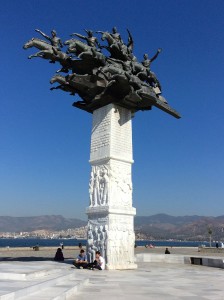 stay at the Izmir Palas Oteli on the Ataturk Cadesi, and have a huge comfy bed and a spacious balcony above the ships and busy ferries, the sea and flaming sunsets,. At breakfast a fat woman takes three hard boiled eggs and eats only their whites.
stay at the Izmir Palas Oteli on the Ataturk Cadesi, and have a huge comfy bed and a spacious balcony above the ships and busy ferries, the sea and flaming sunsets,. At breakfast a fat woman takes three hard boiled eggs and eats only their whites.
Statues of Ataturk (he’s everywhere) and Turkish fighters for the ‘War of Turkish Independence’ along the front. Not hint of the rich ancient city of Smyrna, the great cosmopolitan 19th century city with its opera house and culture, or the 1000s of Greeks who were killed or banished. It is all about Turkish Glory. Nice people, and here in Izmir nearly all women are uncovered, by which I mean no scarves covering their hair, and in restaurants there are girl parties. Hooray.
Copyright Sarah Coles 2018 Privacy Policy Website Design & Creation Forum Media and Design - Alresford